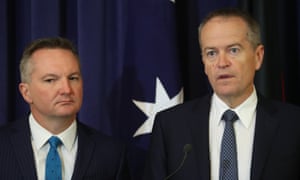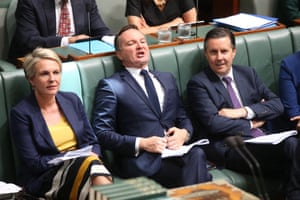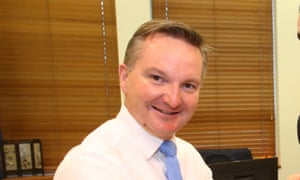Extract from The Guardian
Interview
Shadow treasurer talks about his tax alternatives and why he sees himself continuing Keating’s legacy
• What is Labor’s economic strategy in response to this week’s budget? – Australian politics live podcast
• What is Labor’s economic strategy in response to this week’s budget? – Australian politics live podcast
When you ask Chris Bowen whether he wants to lead the Labor party, you get this answer: “Not particularly. I want to be treasurer.”
“I really want to be treasurer of Australia, that’s my focus. I mean that seriously. I was treasurer [in the last period of government] all too briefly, I’ve got unfinished business. That’s my job, that’s the job I’m focused on. I hope I’m treasurer for a long time.”
In an interview with Guardian Australia’s politics podcast at the tail end of budget week, Bowen plays it with a dead bat when pressed whether it’s plausible he could be the only person in federal politics without active leadership aspirations – he being the most senior figure from the New South Wales right of the ALP.
He believes the future will take care of itself – he won’t rule it in or out. “I’m not going to say I want the job or I don’t want the job,” he says. “I am saying Bill Shorten has the job, I hope he has it for a very long time. I hope he’s a long-serving and successful prime minister and I’m his treasurer for a long time.”
This week, the major parties thrust themselves on to an election footing after using the budget week to announce competing offerings on personal income tax cuts.
The last vestige of the dual citizenship imbroglio that has cut a swathe through Australian politics for the best part of 12 months has also played out this week, creating a mini-election over the next couple of months courtesy of polls in Longman, Braddon, Fremantle and Mayo, as well as in Perth because of the resignation of Tim Hammond for family reasons.
"Neither side will ever switch off the lights and say it is all too hard and we are just going to hand over to the other"
The super Saturday is a harbinger for the real deal, which could happen any time after August, although the prime minister has spent the week insisting the Coalition will run a full term, with no election until next year.
It’s been a week where the Turnbull government has significantly stepped up the negative rhetoric on Shorten, invoking a fresh character assault on the Labor leader, who in turn has leaned in for the fight, declaring the opposition will campaign “house by house, street by street, suburb by suburb”.
Shorten says Labor will use the coming mini-election season as a “referendum on your $80bn corporate tax giveaway to multinationals, big business and the big banks”.

“I really want to be treasurer of Australia, that’s my focus. I mean that seriously. I was treasurer [in the last period of government] all too briefly, I’ve got unfinished business. That’s my job, that’s the job I’m focused on. I hope I’m treasurer for a long time.”
In an interview with Guardian Australia’s politics podcast at the tail end of budget week, Bowen plays it with a dead bat when pressed whether it’s plausible he could be the only person in federal politics without active leadership aspirations – he being the most senior figure from the New South Wales right of the ALP.
He believes the future will take care of itself – he won’t rule it in or out. “I’m not going to say I want the job or I don’t want the job,” he says. “I am saying Bill Shorten has the job, I hope he has it for a very long time. I hope he’s a long-serving and successful prime minister and I’m his treasurer for a long time.”
This week, the major parties thrust themselves on to an election footing after using the budget week to announce competing offerings on personal income tax cuts.
The last vestige of the dual citizenship imbroglio that has cut a swathe through Australian politics for the best part of 12 months has also played out this week, creating a mini-election over the next couple of months courtesy of polls in Longman, Braddon, Fremantle and Mayo, as well as in Perth because of the resignation of Tim Hammond for family reasons.
"Neither side will ever switch off the lights and say it is all too hard and we are just going to hand over to the other"
The super Saturday is a harbinger for the real deal, which could happen any time after August, although the prime minister has spent the week insisting the Coalition will run a full term, with no election until next year.
It’s been a week where the Turnbull government has significantly stepped up the negative rhetoric on Shorten, invoking a fresh character assault on the Labor leader, who in turn has leaned in for the fight, declaring the opposition will campaign “house by house, street by street, suburb by suburb”.
Shorten says Labor will use the coming mini-election season as a “referendum on your $80bn corporate tax giveaway to multinationals, big business and the big banks”.

“These guys [the Coalition] fight hard. I would say sometimes they fight dirty, but they fight hard, there’s a contest. One thing Australians hate is complacency and arrogance, so we are certainly not saying we have the election in the bag. Yes, we’ve been ahead [in the polls] for a long time, but that can change. We don’t take anything for granted.”
While Labor intends to focus politically on the government’s intention to give a tax cut to Australia’s biggest companies – a proposal the opposition rejects – Bowen won’t yet say what his party will do with the company tax cuts that have already been legislated. “We’re not going to drag it out,” the shadow treasurer says, “but we’ll, to coin a phrase, decide our own announcements and the circumstances in which we announce them.”
Labor’s national conference looms in July, creating complications for the leadership as hot-button policies will be contested at the event as well as in the days leading up to it. Bowen acknowledges there will be “lively” debate about economic policy, but says the conversation going on within Labor isn’t a left-right divide. “With due respect, these debates get overblown,” he says. “This isn’t a factional thing.”
He says he and Shorten are rightwingers, but they have presided over Labor’s most progressive policy offering in 40 years.
“I make no apologies for that. I am proud of it. I happen to be a member of the right. Bill Shorten is a member of the right. This is the policy agenda we have developed because it is right for the times.”
Bowen says he has developed several alternatives, such as closing down tax minimisation through family trusts, and reforming negative gearing and capital gains tax. “I’m getting on with the job of doing those things, achieving the same objectives, but in a carefully designed way, and that’s what I will say at the national conference.”
He says Labor will have to demonstrate spending restraint to present itself as a credible alternative to voters at the next election, but insists it was necessary for the party during this period of opposition to look forensically at tax concessions such as negative gearing and dividend imputation – measures that have given Labor considerable fiscal room to outspend the government on social services, and also outbid the Coalition on tax cuts for low and middle-income earners.
Bowen also says Labor’s relationship with the business community is in good shape, despite obvious public tensions between the federal opposition and groups such as the Business Council of Australia.
He suggests some of the combativeness is a broader cultural phenomenon – there is now more polarisation in public debate. “Political debates across the developed world are becoming more polarised. [Australia is] probably doing better than most. We haven’t had Brexit, we haven’t had Trump. We’ve had 27 years of uninterrupted economic growth. Globally, there is more tribalism.”
Bowen says polarisation is being driven, at least in part, by social media platforms reinforcing the views of users rather than presenting a diversity of material, and through mainstream media outlets.

But business also needs to “get its house in order”.
"People say I wish it was like the Hawke Keating years where Labor and business got along – go back and read the clips"
“I make no apologies for, with Bill Shorten, calling for a royal commission into the banks. I don’t think our position has been found wanting,” Bowen says.
“On the relationship between Labor and the business community, I find history instructive. People will say now ‘I wish it was like the Hawke Keating years where Labor and business got along’. Well you go back and read the clips.
“Keating was accused of being anti-business because he brought in the fringe benefits tax and capital gains tax, he was broadening the base and lowering the rates. That’s what we are doing in some respects.
“I see what I’m doing in many respects as a continuation of the Keating legacy. Let’s not pretend the business community was clapping him or he was saying nice things about people in the business community criticising him.”
Bowen says businesses are telling him privately that they think cutting the company tax rate is not a first order priority, but they won’t say that publicly because they “don’t want to rock the boat with the Business Council of Australia”.
He says he maintains a network of relationships in business and has “great discussions” about a range of policy issues. “So, of course, yes, there’s a robust debate politically, I make no apologies for that, and they are entitled to put their views and we are entitled to put ours, but I don’t think it’s as binary [as you suggest]”.
He also has a message for the trade union movement. Shorten is close to several key figures in the union leadership, and Labor has already begun rolling out specific policies the movement is seeking.
But Bowen suggests this conversation won’t all go the ACTU’s way. The ACTU’s wish list will not get an “automatic tick”. He says the party and the movement are “different people with different jobs to do”.
The shadow treasurer says the ACTU is right to run a public campaign to strengthen workplace regulations in an environment where workers face persistently low wages growth. But he says Labor will make its own decisions about where it ultimately draws the policy lines.

No comments:
Post a Comment